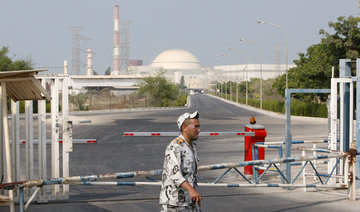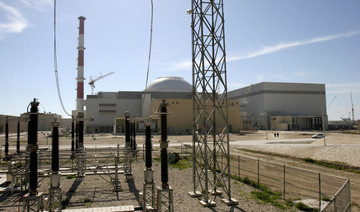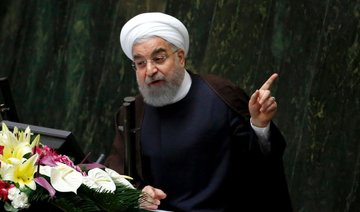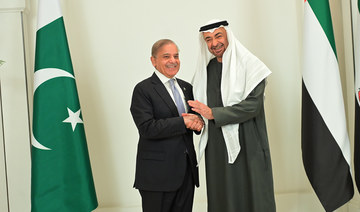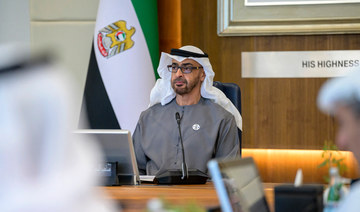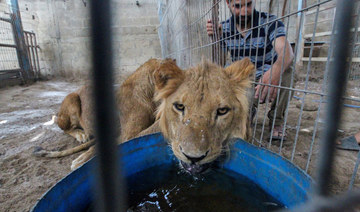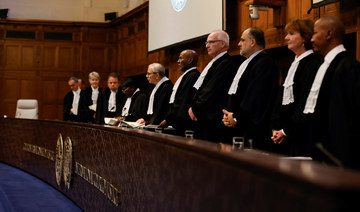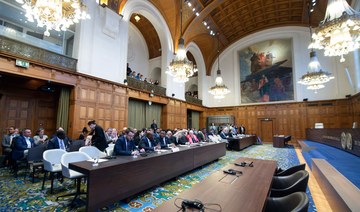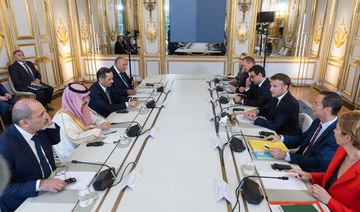TEHRAN: Iran's atomic chief has warned that the country needs only five days to ramp up its uranium enrichment to 20 percent, a level at which the material could be used for a nuclear weapon.
The comments by Ali Akbar Salehi to Iranian state television come as US President Donald Trump repeatedly has threatened to renegotiate or walk away from the 2015 nuclear deal.
Salehi's warning, along with recent comments by Iranian President Hassan Rouhani, show Iran is willing to push back against Trump while still acknowledging they want to keep the deal, which lifted crippling economic sanctions on the country.
"If there is a plan for a reaction and a challenge, we will definitely surprise them," said Salehi, who also serves as one of Rouhani's vice presidents.
"If we make the determination, we are able to resume 20 percent-enrichment in at most five days."
He added: "Definitely, we are not interested in such a thing happening. We have not achieved the deal easily to let it go easily. We are committed to the deal and we are loyal to it."
Iran gave up the majority of its stockpile of 20-percent enriched uranium as part of the nuclear deal it struck with world powers, including Trump's predecessor, President Barack Obama. The accord, which lifted sanctions on Iran, currently caps the Islamic Republic uranium enrichment at 5 percent.
While Iran long has maintained its nuclear program is for peaceful purposes, uranium enriched to 20 percent and above can be used in nuclear bombs. Iran processed its stockpile of near 20 percent uranium into a lower enrichment, turned some into fuel plates to power a research reactor and shipped the rest to Russia as part of the deal.
The Obama administration and most independent experts said at the time of the deal that Iran would need at least a year after abandoning the deal to have enough nuclear material to build a bomb. Before the deal was struck, they said the timeframe for Iran to "break out" toward a bomb was a couple of months.
While the economic benefits of the deal have yet to reach the average Iranian, airlines in the country have signed deals for billions of dollars of aircraft from Airbus and Boeing. Car manufacturers and others have swept into the Iranian market as well as the country has boosted its oil sales. Abandoning the deal would put those economic gains in jeopardy.
Rouhani, a moderate cleric within Iran's theocratically overseen government, warned last week that it could ramp up its nuclear program and quickly achieve a more advanced level if the US continues "threats and sanctions" against his country.
Rouhani's comments were sparked by Trump signing a sanctions bill imposing mandatory penalties on people involved in Iran's ballistic missile program and anyone who does business with them. The US legislation also applies terrorism sanctions to Iran's Revolutionary Guard and enforces an existing arms embargo.
Tehran says only five days needed to ramp up uranium enrichment
Tehran says only five days needed to ramp up uranium enrichment
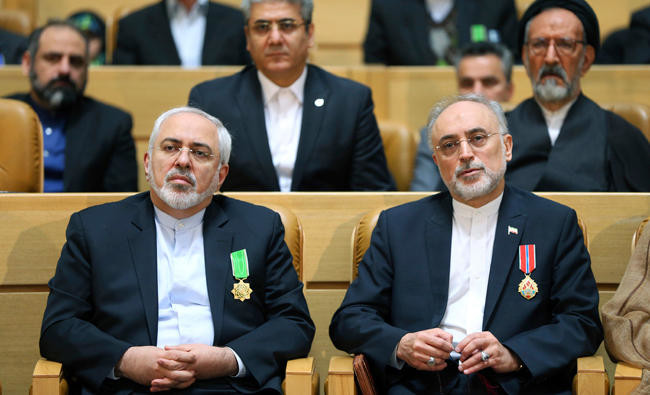
Car blast kills one in Syrian capital: state media
Security incidents, including blasts targeting military and civilian vehicles, occur intermittently in the capital of war-ravaged Syria.
Quoting a police official, SANA said “one person was killed when an explosive device exploded in their car in the Mazzeh district.” It did not provide any other details.
The Syrian Observatory for Human Rights, a Britain-based war monitor with a network of sources on the ground, said three vehicles caught fire in the area.
The explosion comes against a backdrop of heightened regional tensions, including the war between Israel and the Iran-backed Palestinian militant group Hamas in the Gaza Strip.
Last month, an explosive device went off in a car in Mazzeh, an upscale neighborhood of Damascus, without causing any casualties, SANA reported at the time.
Israel has launched hundreds of air strikes in Syria since civil war broke out in 2011, targeting Iran-backed forces including Lebanon’s Hezbollah movement as well as Syrian army positions.
UAE President Sheikh Mohamed embarks on China state visit on May 30
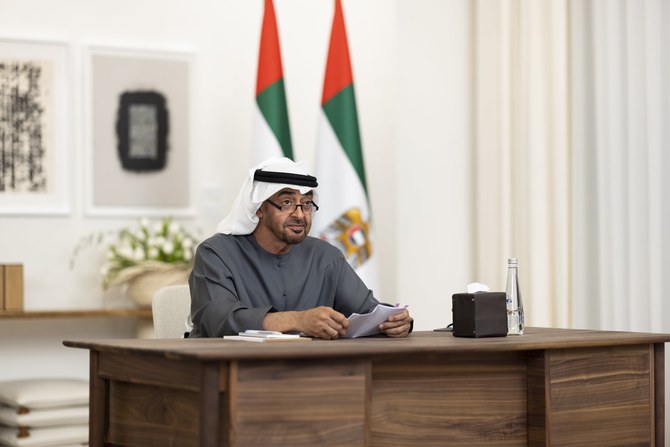
DUBAI: UAE President Sheikh Mohamed bin Zayed Al-Nahyan will have a state visit to China on May 30 following an invitation from his counterpart Xi Jinping.
Discussions between the two leaders would mainly be regarding bilateral relations between the two countries, and how to further strengthen their economic, developmental and cultural ties, state news agency WAM reported.
Sheikh Mohamed will also attend celebrations marking the 40th anniversary of the establishment of diplomatic relations between the UAE and China, and will participate in the 10th Ministerial Conference of the China-Arab States Cooperation Forum.
The UAE leader will have a two-day state visit to South Korea, prior to his arrival in China, at the invitation of President Yoon Suk Yeol.
The two leaders will discuss bilateral ties and explore opportunities for greater collaboration across various sectors including trade, investment, energy and technology.
Israel strikes Rafah after top UN court orders it to halt offensive
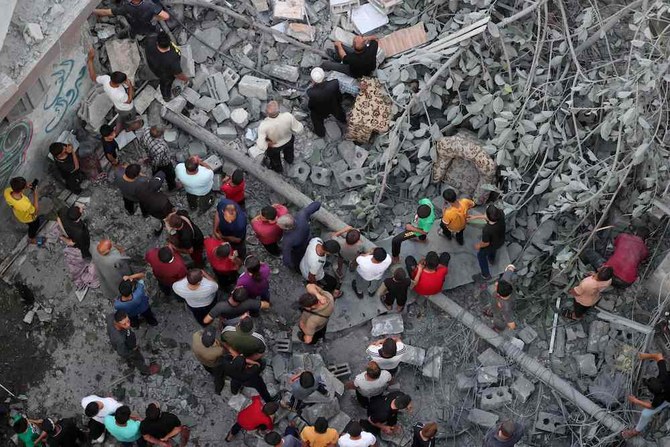
- Israel gives no indication it is preparing to change course in Rafah, insists that the court had got it wrong
- Top UN court earlier ordered Israel to halt military operations in the southern city
RAFAH: Israel bombed the Gaza Strip, including Rafah, on Saturday, a day after the top UN court ordered it to halt military operations in the southern city as efforts get underway in Paris to seek a ceasefire in the war sparked by Hamas’s October 7 attack.
The International Court of Justice (ICJ) also demanded the immediate release of all hostages still held by Palestinian militants, hours after the Israeli military announced troops had recovered the bodies of three more of the captives from northern Gaza.
The Hague-based court, whose orders are legally binding but lack direct enforcement mechanisms, also ordered Israel to keep open the Rafah crossing between Egypt and Gaza, which it closed earlier this month at the start of its assault on the city.
Israel gave no indication it was preparing to change course in Rafah, insisting that the court had got it wrong.
“Israel has not and will not carry out military operations in the Rafah area that create living conditions that could cause the destruction of the Palestinian civilian population, in whole or in part,” National Security Adviser Tzachi Hanegbi said in a joint statement with Israel’s foreign ministry spokesman.
The Palestinian militant group Hamas, which has ruled Gaza since 2007, welcomed the ICJ ruling on Rafah but criticized its decision to exclude the rest of war-torn Gaza from the order.
Continued fighting
Hours after the ICJ ruling, Israel carried out strikes on the Gaza Strip early Saturday while clashes between the Israeli army and the armed wing of Hamas continued.
Palestinian witnesses and AFP teams reported Israeli strikes in Rafah and the central city of Deir Al-Balah.
“We hope that the court’s decision will put pressure on Israel to end this war of extermination, because there is nothing left here,” said Oum Mohammad Al-Ashqa, a Palestinian woman from Gaza City displaced to Deir Al-Balah by the war.
“But Israel is a state that considers itself above the law. Therefore, I do not believe that the shooting or the war will stop other than by force,” said Mohammed Saleh, also met by AFP in the central Gaza Strip city.
In its keenly awaited ruling, the ICJ said Israel must “immediately halt its military offensive, and any other action in the Rafah Governorate, which may inflict on the Palestinian group in Gaza conditions of life that could bring about its physical destruction in whole or in part.”
It ordered Israel to open the Rafah crossing for humanitarian aid and also called for the “immediate and unconditional release” of the hostages held by Hamas in Gaza.
The Gaza war broke out after Hamas’s October 7 attack resulted in the deaths of more than 1,170 people, mostly civilians, according to an AFP tally based on Israeli official figures.
Militants also took 252 hostages, 121 of whom remain in Gaza, including 37 the army says are dead.
Israel’s retaliatory offensive has killed at least 35,800 people in Gaza, mostly women and children, according to the Hamas-run territory’s health ministry.
The Israeli military said the three hostages whose bodies were recovered in north Gaza on Friday — Israeli hostage Chanan Yablonka, Brazilian-Israeli Michel Nisenbaum and French-Mexican Orion Hernandez Radoux — were “murdered” during the October 7 attack and their bodies taken to Gaza.
Truce talks
The court order comes ahead of separate meetings on the Gaza conflict in Paris between the CIA chief and Israeli representatives on one side and French President Emmanuel Macron and the foreign ministers of four key Arab states on the other.
Ceasefire talks involving US, Egyptian and Qatari mediators ended shortly after Israel launched the Rafah operation, though Prime Minister Benjamin Netanyahu’s office this week said the war cabinet had asked the Israeli delegation “to continue negotiations for the return of the hostages.”
CIA chief Bill Burns was expected to meet Israeli representatives in Paris in a bid to relaunch negotiations, a Western source close to the issue said.
Separately, French President Emmanuel Macron received the prime minister of Qatar and the Saudi, Egyptian and Jordanian foreign ministers on Friday “to press for a ceasefire,” according to Cairo.
The French presidency said they held talks on the Gaza war and ways to set up a Palestinian state alongside Israel.
The five countries discussed “the effective implementation of the two-state solution,” it added.
Top US diplomat Antony Blinken also spoke with Israeli war cabinet minister Benny Gantz about new efforts to achieve a ceasefire and reopening of the Rafah border crossing as soon as possible, Washington said.
Aid stuck
Israeli ground troops started moving into Rafah in early May, defying global opposition.
Troops took over the Palestinian side of the Rafah border crossing with Egypt, further slowing sporadic deliveries of aid for Gaza’s 2.4 million people.
But on Friday, Egyptian President Abdel Fattah El-Sisi agreed in a call with his US counterpart Joe Biden to allow UN aid through the other entry point into southern Gaza, the Kerem Shalom crossing from Israel, the White House said.
The US military has also installed a temporary jetty on the Gaza coast to receive aid by sea that a UN spokesman said had delivered 97 trucks of aid after “a rocky start” a week ago.
The security and humanitarian situation in the territory remains alarming, with a risk of famine, hospitals out of service, and around 800,000 people, according to the United Nations, having fled Rafah in the last two weeks.
UN humanitarian chief Martin Griffiths said the situation had reached “a moment of clarity.”
“Aid workers and UN staff must be able to carry out their jobs in safety,” he posted on social media site X late Friday.
“At a time when the people of Gaza are staring down famine... it is more critical than ever to heed the calls made over the last seven months: Release the hostages. Agree a ceasefire. End this nightmare.”
Gaza zookeeper fears for his animals after fleeing Rafah
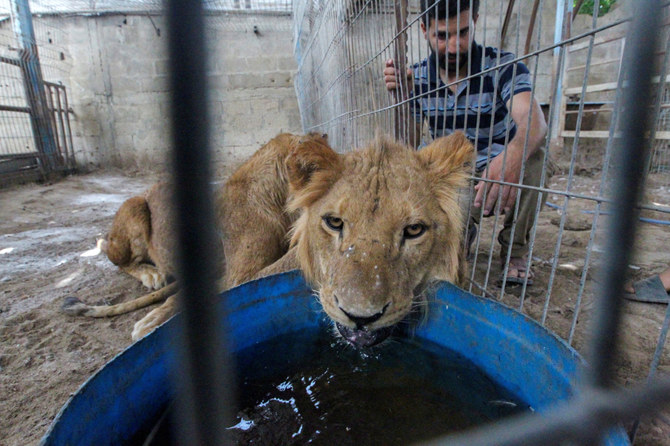
KHAN YOUNIS: In a cowshed in Gaza’s Khan Younis, zookeeper Fathi Ahmed Gomaa has created a temporary home for dozens of animals, including lions and baboons, having fled with them from Israel’s offensive in Rafah.
“We’ve moved all the animals we had, except for three big lions that remain (in Rafah),” he said.
“I ran out of time and couldn’t move them.” Ahmed abandoned his zoo in Rafah when Israel ordered the evacuation of parts of the southern Gazan city.
Before the offensive, the city on the border with Egypt had been spared a ground invasion, and more than half of the Gaza Strip’s population was sheltering there.
Now, the Israeli offensive has sent more than 800,000 people fleeing from Rafah, according to the UN, with Gomaa and his family among them.
“I am appealing to the Israeli authorities: these animals have no connection to terrorism,” Gomaa said, saying he wanted their help in coordinating with aid agencies to rescue the lions left behind in Rafah.
He fears they won’t survive long on their own.
“Of course, within a week or 10 days, if we don’t get them out, they will die because they’ll be left with no food or water.”
Gomaa said he had already lost several of his animals to the war: “Three lion cubs, five monkeys, a newborn monkey, and nine squirrels.”
And while the squawking of parrots fills the air, many of Gomaa’s other birds are no longer with him.
“I released some of the dogs, some of the hawks and eagles, some of the pigeons, and some of the ornamental birds. I released many of them because we didn’t have cages to transport them.”
In the cowshed, Gomaa is making do with what he has, using improvised fencing to raise the heights of the pens so that their new inhabitants, spotted deer, can’t leap out.
Israeli troops began their assault on Rafah on May 7, defying widespread international concern for the safety of the 1.4 million civilians sheltering in the city.
EU considers possible Rafah border mission, diplomats say
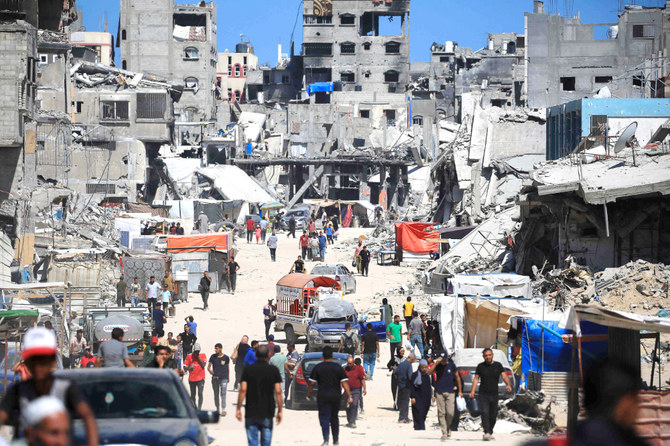
BRUSSELS: Talks on deploying a EU mission at the Rafah border crossing in Gaza are at a preliminary stage and the deployment will not happen without an end to the war between Israel and Hamas, a senior EU official said on Friday.
EU foreign ministers will hold their monthly meeting in Brussels on Monday, and discuss how to improve humanitarian aid deliveries to Gaza.
Two diplomats said the US had suggested the EU revive its EU Border Assistance Mission or EUBAM Rafah, which has not been operational since 2007, when Hamas seized full control of Gaza.
The crossing is the main entry point for aid from Egypt and has been closed since Israeli forces took control of it from the Gazan side nearly three weeks ago.
Rafah city is now fire in an Israeli military assault, which judges at the top UN court said on Friday should immediately halt.
“Even if we now have people on the ground talking to the different parties and seeing how it could be done, we are in a very preliminary part of the story,” said the senior official.
The official said EU foreign policy chief Josep Borrell could be mandated by the 27 members on Monday to come up with “some kind of operative conclusions that could allow the mission to deploy.”
He said a deployment could not happen “in the current circumstances, not in war circumstances.”
“We are talking about the future,” the official said.
Three EU diplomats said the discussion would be on the table, but there was nothing concrete to discuss. One said the proposal was a “long shot.”
The mission would need unanimous approval from EU member states. Also, EUBAM is a civilian mission, and given the potentially dangerous nature of the operation, personnel and equipment would need to be adapted.
Diplomats said that such a mission could go ahead only if Egypt and Israel were also in favor.
Two US officials said Washington was reviewing options to secure the opening of the Rafah crossing, but no definitive plans have been developed yet. Israel began its offensive in Gaza after Hamas’ deadly attack on southern Israel on Oct. 7.


